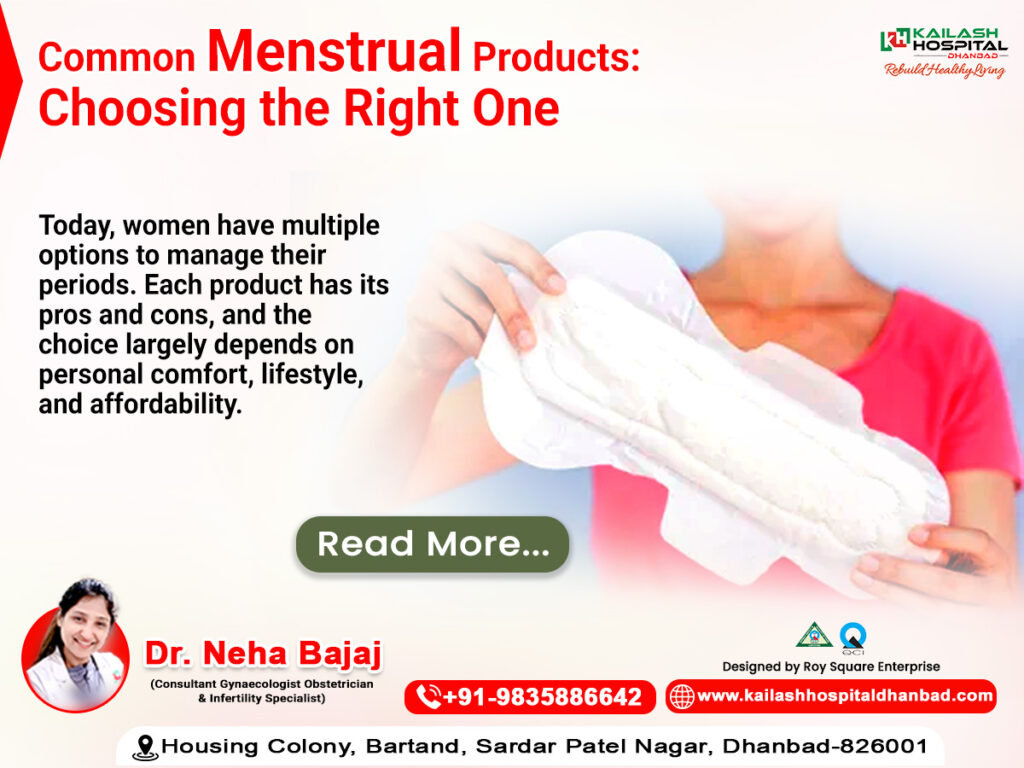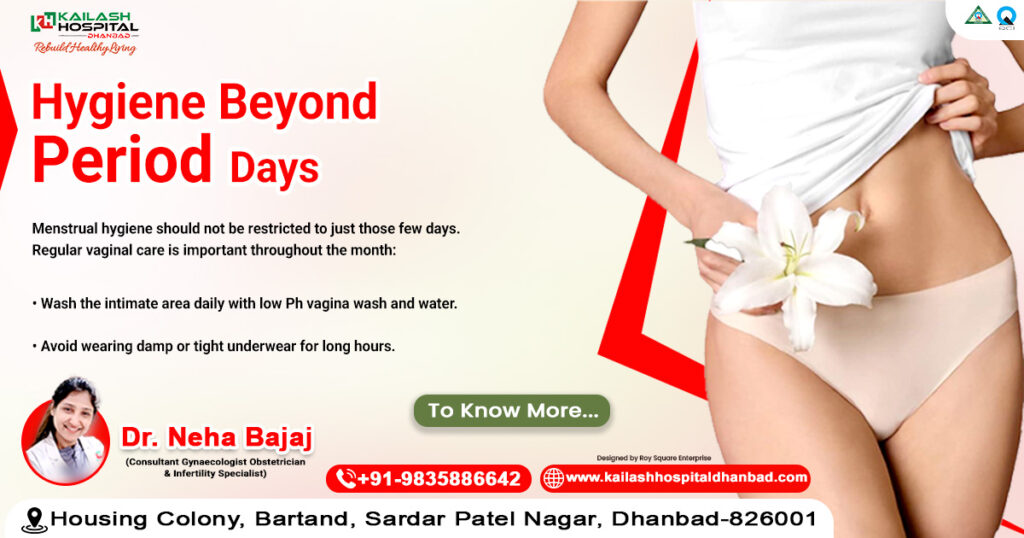Menstruation is a natural and healthy part of a woman’s life, yet it is still surrounded by stigma, myths, and misinformation. Proper menstrual hygiene is not only essential for comfort but also plays a crucial role in maintaining reproductive health, preventing infections, and ensuring overall well-being. Unfortunately, many women and young girls often lack access to the right knowledge and resources to manage their periods safely.
To help bridge this gap, we have put together a detailed guide on menstrual hygiene tips, with insights shared by Dr. Neha Bajaj, Consultant Gynaecologist at Kailash Hospital, Dhanbad. With her extensive experience in women’s health, Dr. Bajaj emphasizes that menstrual hygiene should be treated as a priority, not an afterthought.
Why Menstrual Hygiene Matters
Before diving into the tips, it’s important to understand why menstrual hygiene is so crucial:
- Prevents infections – Poor hygiene during periods can lead to bacterial and fungal infections, including urinary tract infections (UTIs) and reproductive tract infections.
- Promotes comfort – Good hygiene practices reduce irritation, odor, and discomfort, making it easier to go about daily activities.
- Boosts confidence – When women feel fresh and protected, they can focus better on work, school, and social life.
- Supports reproductive health – Maintaining cleanliness helps in preventing complications that may affect fertility in the long run.
According to Dr. Neha Bajaj, “Menstrual hygiene is not only about physical health but also about mental well-being. When women feel secure and comfortable during their periods, it positively impacts their self-esteem and overall lifestyle.”
Common Menstrual Products: Choosing the Right One

Today, women have multiple options to manage their periods. Each product has its pros and cons, and the choice largely depends on personal comfort, lifestyle, and affordability.
1. Sanitary Pads
- Most commonly used in India.
- Available in different sizes and thicknesses.
- Should be changed every 4–6 hours to prevent infections.
- Easily available and beginner-friendly.
2. Tampons
- Inserted inside the vagina to absorb menstrual blood.
- Convenient for women who play sports or swim.
- Must be changed every 4–6 hours to avoid toxic shock syndrome (TSS).
- Some women may take time to get comfortable with tampons.
3. Menstrual Cups
- Eco-friendly and reusable option.
- Made of medical-grade silicone.
- Can last up to 8–10 years if maintained properly.
- Needs proper cleaning before and after each cycle.
4. Period Panties
- Designed with absorbent layers to hold menstrual blood.
- Comfortable and reusable.
- Suitable for light to medium flow or as backup with other products.
Tip from Dr. Neha Bajaj: “Always choose menstrual products that suit your flow and comfort level. If you experience rashes, allergies, or unusual discomfort, consult a Gynaecologist immediately instead of switching products blindly.”
Essential Menstrual Hygiene Tips
1. Change Regularly
- Sanitary pads/tampons: every 4–6 hours.
- Menstrual cups: can be emptied every 6–8 hours depending on flow.
- Wearing the same product for too long increases the risk of infections and bad Odor.
- Replace menstrual products frequently to keep yourself fresh, avoid odors, and prevent infections. Sanitary pads should be changed every 4–6 hours (or more often for heavier flow), while tampons should be changed every 4–8 hours, never exceeding 8 hours. Menstrual cups also require regular emptying, cleaning, and periodic sterilization
2. Wash Properly
- Use mild & low Ph vagina wash and water to clean the genital area.
- Avoid harsh soaps, scented washes, or douching as they disturb the natural vaginal flora.
- Always wash front to back to avoid spreading bacteria.
- Always wash your hands with soap and water before and after using menstrual products. This simple act helps prevent the spread of bacteria and greatly reduces your risk of infections
- Clean only the external genital area (the vulva) once or twice daily using warm water and a mild, unscented soap. Avoid douching, scented washes, or anything that alters your vagina’s natural pH—your body is self-cleaning and delicate products can cause irritation or infections.
3. Dispose Responsibly
- Wrap used sanitary pads/tampons in paper before discarding.
- Do not flush pads or tampons as they may clog drains.
- If using menstrual cups or cloth pads, wash and sterilize them properly before reuse.
4. Wear Comfortable Underwear
- Choose breathable cotton underwear to avoid excessive moisture and irritation.
- Change underwear daily, and if necessary, more than once a day during heavy flow.
5. Stay Hydrated & Eat Healthy
- Drink plenty of water to reduce bloating and fatigue.
- Include iron-rich foods like spinach, beetroot, and legumes to replenish blood loss.
- Avoid excessive caffeine, junk food, and processed sugar as they may worsen cramps.
6. Stay Active
- Light exercises, stretching, or yoga can help relieve cramps.
- Activities like walking or cycling improve blood circulation and reduce mood swings.
7. Be Prepared
- Always carry an extra pad/tampon in your bag.
- Keep a small pouch with tissues, hand sanitizer, and pain relief medication if needed.
Myths vs. Facts About Menstrual Hygiene
There are many myths about periods that continue to mislead young girls and women. Let’s clear up some of the most common misconceptions.
- Myth: You should not bathe during periods.
- Fact: Bathing daily keeps you clean and reduces the risk of infections.
- Myth: Exercise should be avoided during menstruation.
- Fact: Light to moderate exercise can actually reduce cramps and improve mood.
- Myth: Menstrual blood is impure.
- Fact: Menstrual blood is simply a mix of blood and uterine lining. It is not dirty or impure.
- Myth: Using tampons affects virginity.
- Fact: Virginity is a social concept, not a physical condition. Tampons do not determine virginity.
Dr. Neha Bajaj strongly emphasizes: “It is high time we break these taboos. Educating young girls and women about the truth will empower them to take charge of their health without shame or hesitation.”
Hygiene Beyond Period Days

Menstrual hygiene should not be restricted to just those few days. Regular vaginal care is important throughout the month:
- Wash the intimate area daily with mild soap and water.
- Avoid wearing damp or tight underwear for long hours.
- opt for breathable fabrics.
- See a doctor if you notice unusual discharge, persistent itching, or foul odor.
When to See a Gynaecologist
While some discomfort during periods is normal, certain symptoms should not be ignored:
- Severe cramps that do not improve with over-the-counter medicines.
- Very heavy bleeding requiring frequent pad/tampon changes (every 1–2 hours).
- Irregular cycles or sudden missed periods.
- Foul-smelling discharge or itching.
- Dizziness or fainting spells during menstruation.
If you experience any of these, consult a specialist. Dr. Neha Bajaj, Consultant Gynaecologist at Kailash Hospital, Dhanbad, provides comprehensive care for menstrual issues, reproductive health, and women’s wellness. Her patient-friendly approach ensures that women feel comfortable discussing even the most sensitive concerns.
Creating Awareness

Improving menstrual hygiene is not just an individual responsibility—it’s a collective one. Families, schools, workplaces, and communities need to normalize conversations about menstruation.
- Parents should openly discuss periods with daughters to prepare them early.
- Schools should provide menstrual education and safe facilities.
- Workplaces should support female employees with flexible policies and clean restrooms.
- Society should break the silence and treat menstruation as a normal biological process.
Final Thoughts
Menstrual hygiene is about much more than just staying clean during your period—it’s about protecting your health, maintaining comfort, and breaking free from taboos. Every woman deserves to manage her menstruation with dignity, safety, and confidence.
As Dr. Neha Bajaj, Consultant Gynaecologist at Kailash Hospital Dhanbad, advises:
“A woman who takes care of her menstrual hygiene takes care of her overall health. Don’t hesitate to seek medical help when needed. Open conversations and awareness can transform the way we approach menstruation.”
By following the right hygiene practices, making informed choices about menstrual products, and spreading awareness, we can ensure a healthier and more empowered future for all women.
Top 10 Frequently Asked Questions (FAQs) About Menstrual Hygiene
1. How often should I change my sanitary pad or tampon?
You should change your pad or tampon every 4–6 hours. During heavy flow, it may be required more frequently. Keeping the same product for too long increases infection risk.
2. Is it safe to use a menstrual cup?
Yes. Menstrual cups are made of medical-grade silicone, safe, eco-friendly, and reusable. With proper cleaning, they can last up to 8–10 years.
3. Can I exercise during my periods?
Absolutely. Light to moderate exercise, yoga, or even walking can reduce cramps and improve mood. Avoiding exercise is a myth.
4. Should I wash my intimate area with soap during periods?
You should wash with mild soap and water. Avoid harsh soaps, antiseptics, or scented washes, as they disturb the natural vaginal balance.
5. What is the best way to dispose of used sanitary products?
- Wrap them in paper or a disposal bag before discarding.
- Never flush pads or tampons as they can clog drains.
- For reusable products (cups or cloth pads), wash and sterilize properly.
6. How can I prevent rashes during periods?
- Change pads frequently.
- Use cotton underwear.
- Keep the area dry and clean.
- If irritation persists, consult a Gynaecologist.
7. Is it normal to have irregular periods?
Occasional irregularity is common due to stress, diet, or hormonal changes. But if your cycles are consistently irregular, it’s best to consult a specialist like Dr. Neha Bajaj, Consultant Gynaecologist at Kailash Hospital, Dhanbad.
8. Can menstrual hygiene affect fertility?
Yes. Poor hygiene can lead to infections of the reproductive tract, which may affect fertility in the long run. Maintaining cleanliness is essential for reproductive health.
9. Is bathing allowed during periods?
Yes. Bathing daily keeps you clean, prevents odor, and reduces infection risk. Avoiding baths during menstruation is a myth.
10. When should I see a doctor about my periods?
See a Gynaecologist if you experience:
- Severe cramps unrelieved by medicines
- Very heavy bleeding (changing pads every 1–2 hours)
- Foul-smelling discharge or itching
- Irregular or missed periods
- Dizziness or fainting spells during menstruation.



